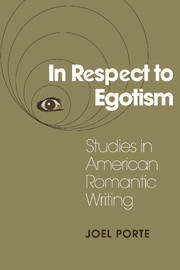Book contents
- Frontmatter
- Contents
- Preface
- Acknowledgments
- In Respect to Egotism
- Introduction: Writing, Reading, Romanticism
- 1 “Where … Is This Singular Career to Terminate?”: Bewildered Pilgrims in Early American Fiction
- 2 “Where There Is No Vision, the People Perish.…”: Prophets and Pariahs in the Forest of the New World
- 3 Poe: Romantic Center, Critical Margin
- 4 Emerson: Experiments in Self-Creation
- 5 Hawthorne: “The Obscurest Man of Letters in America”
- 6 Thoreau's Self-Perpetuating Artifacts
- 7 Melville: Romantic Cock-and-Bull; or, The Great Art of Telling the Truth
- 8 Douglass and Stowe: Scriptures of the Redeemed Self
- 9 Whitman: “Take Me as I Am or Not at All.…”
- Interchapter: Walt and Emily
- 10 Dickinson's “Celestial Vail”: Snowbound in Self-Consciousness
- Notes
- Index
- CAMBRIDGE STUDIES IN AMERICAN LITERATURE AND CULTURE
Interchapter: Walt and Emily
Published online by Cambridge University Press: 24 March 2010
- Frontmatter
- Contents
- Preface
- Acknowledgments
- In Respect to Egotism
- Introduction: Writing, Reading, Romanticism
- 1 “Where … Is This Singular Career to Terminate?”: Bewildered Pilgrims in Early American Fiction
- 2 “Where There Is No Vision, the People Perish.…”: Prophets and Pariahs in the Forest of the New World
- 3 Poe: Romantic Center, Critical Margin
- 4 Emerson: Experiments in Self-Creation
- 5 Hawthorne: “The Obscurest Man of Letters in America”
- 6 Thoreau's Self-Perpetuating Artifacts
- 7 Melville: Romantic Cock-and-Bull; or, The Great Art of Telling the Truth
- 8 Douglass and Stowe: Scriptures of the Redeemed Self
- 9 Whitman: “Take Me as I Am or Not at All.…”
- Interchapter: Walt and Emily
- 10 Dickinson's “Celestial Vail”: Snowbound in Self-Consciousness
- Notes
- Index
- CAMBRIDGE STUDIES IN AMERICAN LITERATURE AND CULTURE
Summary
Of all the now seemingly inevitable pairings in nineteenth-century American literature, Whitman and Dickinson still may strike us as the strangest. Unlike, say, Henry James and Edith Wharton (good friends, master and disciple), Whitman and Dickinson were not bound by ties of personal relation or influence. So far as the other was concerned, each of these two might have lived on the moon (and mid-nineteenth-century Amherst probably would have struck Whitman as sufficiently lunatic; ditto New York for Dickinson). This is the same epoch in our literature when Whitman and Melville, exact contemporaries and both living and working for a time in New York, seem to have been almost completely oblivious of each other. But Melville, of course, did discover Hawthorne, Thoreau sought out Whitman, and Emerson, one way or another, came upon or was pounced upon by almost everybody. Which is to say that the crucial middle term, culturally and literarily speaking, between Whitman and Dickinson was the improbable Brahma-Bacchus-Buddha of Concord, and that mutual influence quite naturally continues to engage critical interest. But we do not link Whitman and Dickinson only because of Emerson; put simply, in stunning contradistinction to what their own age would have believed, they have turned out to be the major poets of their time. “She and Walt Whitman,” writes one literary historian, “represent the farthest pioneerings of the nineteenth-century American mind in the trackless regions of spirit, in so far as they are reflected in poetry.”
What they both seemed to represent, however, to received, or establishment, literary opinion when they appeared on the scene was disorder and the breaching of decorum.
- Type
- Chapter
- Information
- In Respect to EgotismStudies in American Romantic Writing, pp. 243 - 249Publisher: Cambridge University PressPrint publication year: 1991



